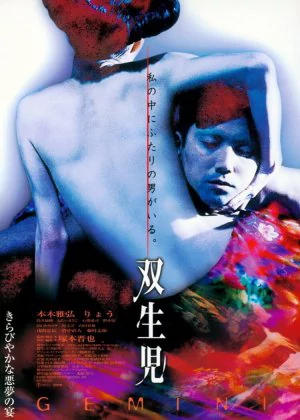Gemini
Shinya Tsukamoto is one of my all-time favorite directors. Tetsuo was a landmark in my exploration of film and opened a door to a different kind of cinema. And apart from maybe Yokai Hanta - Hiruko (his first studio project) Tsukamoto hasn't made a bad film yet. Gemini [Soseiji] has always been a rather odd film in Tsukamoto's oeuvre though, so I was looking forward to seeing how it would stand up to the test of time.
![screen capture of Gemini [Soseiji]](/thumbs/img/articles/1200xauto/gemini-1.webp)
Tsukamoto is known for doing just about everything himself, including screenplay and story. Gemini marks one of the few times he worked with existing material. Gemini is based upon a short story by famed Japanese writer Edogawa Rampo, a match made in heaven. Rampo's dark and twisted tales form an ideal basis for Tsukamoto's vibrant and energetic style. With Gemini Tsukamoto created the perfect middle ground for the two styles to merge and grow into something completely unique.
Gemini isn't a full-blown, manic, and out-of-control Tsukamoto flick, instead, he starts from an extremely controlled and distinguished environment. The film follows Yukio, a successful doctor (clearly upper class) respected by his fellow citizens. The only dark spot on his reputation is his relationship with Rin, a woman he rescued after her house burned down and who suffers from memory loss. His parents distrust Rin, but Yukio is madly in love with her and won't budge from their relationship.
Life in the slums stands in heavy contrast with Yukio's upper-class life. The slums are rotten neighborhoods where criminals run amok and disease breeds freely. When a woman with the plague finds her way to Yukio's doctor's practice, she brings an unexpected visitor with her. The two worlds start to mingle and in no time Yukio sees his world collapsing from under his feet. It's the start of a strange love triangle that quickly takes on grotesque forms.
![screen capture of Gemini [Soseiji]](/thumbs/img/articles/1200xauto/gemini-2.webp)
Visually Gemini consists of two separate styles that slowly converge. Yokio's world is rigid and cold. Monochrome colors and static camera work capture the atmosphere perfectly. In contrast, the world of the slums is lively and colorful, brought to life with Tsukamoto's trademark visual style. The characters' styling also matches this divide in worlds, with Yokio and his parents looking very pristine and cultured, while the slum people look pleasantly outlandish. A stark visual contrast that slowly disappears as the story progresses.
The soundtrack sticks to a very similar split in styles. Chu Ishikawa (Tsukamoto's regular composer) is present again and delivers what may be one of his best scores. The more subtle, tepid tracks that go with Yukio's world are good but not that remarkable, but the excessive, outspoken song introducing the slum world is simply epic. While different in style and atmosphere, it may be best compared to the famous opening song of Kokaku Kidotai, equally recognizable and a full-scale napalm bomb of atmosphere. Music like this helps to define a film.
The acting is a bit overstated, typical for Tsukamoto's "Kaiju Theater" style of directing, but it works well. Yukio (Masahiro Motoki) and Rin (Ryo) act very stiff and well-behaved, while the slum people are more lively and energetic. There's a great secondary cast, with interesting cameos of Tadanobu Asano (Vital), Tomorowo Taguchi (Tokyo Fist, Tetsuo: Bullet Man), and Renji Ishibashi, but the weight of the film clearly rests on the shoulders of Ryo and Motoki.
![screen capture of Gemini [Soseiji]](/thumbs/img/articles/1200xauto/gemini-3.webp)
Even though it's listed as a horror film and Rampo's material is morbid and dark enough to qualify, don't expect anything in the way of modern horror though. Instead, Gemini is a darker, more psychological tale of terror that draws its strength from style, atmosphere and twisted premise. Around halfway through, when both worlds finally start to blend together, the film gets up to full steam and doesn't let go until the very last frame. It may not be Tsukamoto at his most intense, but that doesn't mean it isn't any bit as good.
Gemini could be considered a good entry-level Tsukamoto since his typical style isn't as demanding as in his other films. On the other hand, liking Gemini doesn't exactly guarantee liking the rest of Tsukamoto's oeuvre. Whatever the case, Gemini is a stylish, dark, and twisted mix of Rampo and Tsukamoto elements, complementing each other perfectly. It's a film that still stands proud and hasn't lost any of its appeal due to Tsukamoto's excellent direction.
